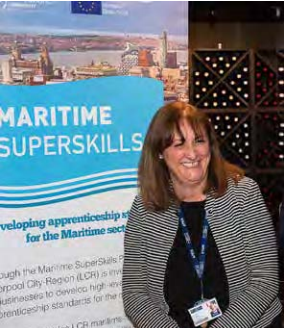Maritime jobs boost: new opportunities for employers to up-skill workforce
The Institute for Apprenticeships (IFA) has now approved over 300 new apprenticeship standards for delivery.
Ranging from intermediate level 2 standards to degree and even Masters level qualifications, these standards span a wide range of occupations in sectors from business and hospitality to engineering, transport and logistics.
For SME businesses, there is government funding available for apprenticeships, which is open to all employees, irrespective of age and experience.
Unlike previous schemes, this subsidy is not restricted to young people at the start of their careers or to employees new to the business.
As a result, more and more employers are up-skilling new or existing staff with higher-level apprenticeships and making a real difference to their productivity.
A local project in the maritime sector is paving the way for higher-level apprenticeships by developing new standards in occupations important to employers.
The Maritime SuperSkills Project is partly funded by the European Social Fund (ESF), and is led by Liverpool John Moores University, supported by Mersey Maritime, The Engineering College, Wirral Metropolitan College, Port Academy Liverpool at Hugh Baird College and the Northern Logistics Academy.
Over the past year, the project has worked with Trailblazer groups of employers, including Stena Line, Royal Fleet Auxiliary, Brookes Bell and Birkenhead-based Carmet Tug Company Ltd to develop higher-level standards for Marine Technical Superintendent and Marine Surveyor, and will be working to complete these standards over the coming months.
Employers on these Trailblazers have had first-hand experience of the IFA development process and have worked with colleagues from other organisations to agree the skills and training needed for the future.
Thomas Campbell, Trailblazer Chairperson from Stena Line said: “The Maritime SuperSkills Project offers employers the opportunity to shape the maritime occupations of the future, whilst contributing to the strengthening of the local economy. It’s an effective way of nurturing talent by providing people with the prospect of a high-level occupation and a clear pathway for future career progression.”

Diane Fitch, Project Manager for the Maritime SuperSkills Project is urging local employers to get involved.
“The voice of the SME is seldom heard when it comes to the skills agenda. Increased productivity is the mantra of the times and there is a demonstrable link between skills and increased productivity, but how easy is it to achieve in reality? We want to hear from SMEs themselves about some of the issues, barriers and challenges they are facing
in up-skilling their workforce,” she said.
If you want to know more, please contact Diane and the project team on:
Email: MSS@ljmu.ac.uk
Phone: 0151 231 2790

